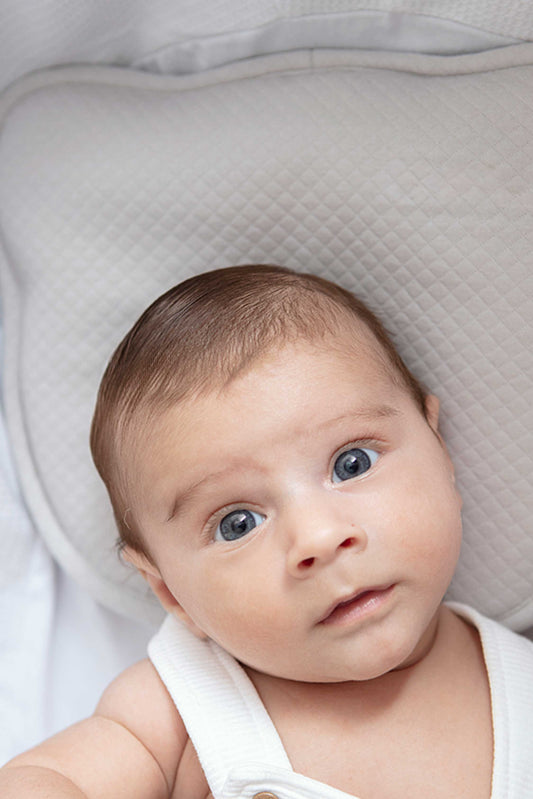Sleep deprivation not only affects your child, but the whole family. In fact, you’ll suffer from sleep deprivation when your child comes into your bedroom looking for you every two hours during the night and your toddler won’t sleep.
You too will find it harder to concentrate, feel more irritable and not yourself anymore. Not to worry, I’m going to explain how you can prevent this scenario from repeating itself night after night and understand the importance of sleep in child development.
The perfect recipe for a good night's sleep doesn’t exist
There’s lots of information available on the internet on how much sleep do children need, how many hours should a child sleep, how often and why do children need sleep, and it can all prove to be a little overwhelming.
Just like with adults, every child has their own individual requirement for sleep, similar to each of our individual hunger need.
How do you find out how your own child sleeps best and what is the recommended sleep for children? It depends on various factors, such as age, activity level (both mental and physical activities can tire little ones out) and, of course, his or her individual bio-rhythm.
First of all:
Observe: When does your child tend to become tired? How long does it take them to fall asleep? What do they need to fall asleep? How long does your child sleep for?
Take note. Keep track of your child's sleep over a few days. This should be a period of time when your child is relaxed and serene, it will give you a good insight into their natural bio-rhythm and their individual sleep needs.
It’s also important to know that a person's sleep may change due to external circumstances such as illness, general environmental conditions (light, noise, temperature) or developmental leaps. These can all impact how many hours sleep do children need each night.
Three ingredients for a good night's sleep: practical help and advice
Once you’ve spent time observing your child, you should have a complete picture of what your child's sleep behaviour pattern looks like. Now, what should you do?
There are three main factors that play an important role in falling asleep. Let us look at them together.
1. Not being tired or being overly tired
The more tired you are the better, right? Wrong!
It goes without saying that if you put your child to bed when they are particularly lively and full of energy, falling to sleep will be a struggle.
However, being too tired is no good either. When we’re overly tired, not only does our mood change (hello tantrums!), but it also makes it even harder to calm down.
This is due to the neurotransmitter dopamine. This is released when we are tired and prevents us from falling asleep as our body tries to activate its attention reserves to keep the brain awake while the rest of our body is super tired.
Here’s what helps:
- Identify your child’s level of tiredness.
- To ensure your child goes to bed at the right time for them, you need to set a regular daily routine and a fixed sleep routine (and stick to it also at weekends and holidays).
- Observe your child’s sleep cues. Even newborn babies show clear signs of tiredness: yawning, rubbing their eyes, reddened ears, a gaze in their eyes, signs of fussiness, tugging their ears, etc – are all common newborn sleep cues. As soon as you are able to interpret your child’s sleep cues correctly, you’ll be able to help your child fall asleep much easier.
2. Feeling safe - the monster under the bed
A child needs to feel safe and secure in order to fall asleep peacefully. A swift ‘monsters don’t exist' will not help.
Adults hear strange noises too, perhaps coming from the refrigerator or the drains, but children’s developing imaginations can truly believe that there is indeed a monster in their wardrobe or underneath their bed.
Yes, Mum and Dad may be just next door, but this isn’t soothing enough for a young child. For them, it's like spending the night alone in the wilderness, surrounded by flashing eyes and strange noises.
Here’s what helps:
- Take your child's fear seriously and stay in the room with them for as long as possible.
- Check the wardrobe and the bed carefully so as not to miss even the smallest of monsters. Hanging jumpers or jackets can look very scary in the dark.
- Going to sleep together at the same time gives children an additional sense of security. Snuggle up in bed together, read a bedtime story (this should not last longer than 30 minutes) or listen to some calming music or bedtime lullabies together. Also make sure you are fully 'present' and relaxed. If you can't fall asleep, neither will your child.
- A good old-fashioned night light can also help your child feel safer. There are many different types available on the Internet, so you’ll be able to find the ideal night light for you!
3. Go to bed feeling relaxed
A typical day is quite tiring for children: they are subjected to many new things and different experiences.
Going to bed when we’re feeling stressed or under the grip of strong emotions will not aid sleep. A child needs to be relaxed when going to bed. What can you do? Find a way to calm down and relax together every night, and make it a habitual part of your routine. It will be good for you too!
Here's what helps:
- Eliminating stimuli before bedtime: no television, computer, mobile phone or other electronic devices with blue lights.
- No exciting stories, lively games, upsetting topics or discussions.
- Children's sleep meditation music or exercises specifically designed to help them relax and calm down. Try some together!
One last piece of advice, especially true if your child is particulary sensitive, communicate with them in a more empathetic way. This will also prove to have a positive effect on their sleep. No matter how hard you try, sometimes falling asleep can just be a struggle. Be patient, create a relaxing environment and support your child as much as possible.
If your child struggles to fall asleep or stay asleep throughout the night, avoid resorting to reward charts, telling them off or even punishment. This will only cause further sleep problems in children.
With practice as well as trial and error, sooner or later you’ll find the right way that works for you and always remember: TOGETHER you can do it!
Birgit Gattringer (Parent Training)
Birgit Gattringer is Jesper Juul familylab trainer, a qualified mental trainer for parents, children, and teenagers. A mum of two boys herself, she passes on her knowledge via the website www.starkekids.com
Her ambition is to create a harmonious environment for children, where they can grow up to be confident and strong for life.










